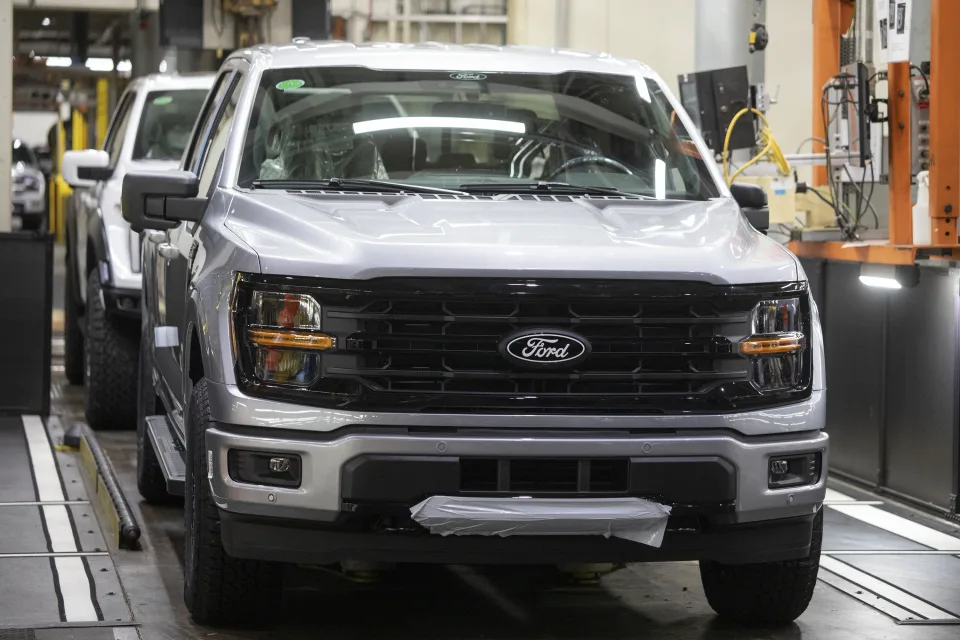
Ford (F) reported first quarter results after the bell that beat expectations on Wednesday, with its changing product game plan front and center along with its focus on gas and hybrid offerings. Ford also boosted some guidance metrics but not its full-year profit outlook.
For the quarter, Ford reported revenue of $42.8 billion, beating estimates of $40.04 billion and up 3% compared to a year ago. Ford posted adjusted earnings per share of $0.49, topping forecasts of $0.42, with adjusted EBIT (earnings before interest and taxes) coming in at $2.8 billion, compared to estimates of $2.54 billion. Ford’s results were better than those in Q4 when it was dealing with the lingering effects of the United Auto Workers (UAW) strike.
Ford said full-year adjusted EBIT was tracking to the higher end of $10 billion to $12 billion, though it raised its adjusted free cash flow target to $6.5 billion to $7.5 billion, with capital expenditures guidance tightened to $8 billion to $9 billion. Previously Ford projected adjusted EBIT of $10 billion to $12 billion, adjusted free cash flow of $6 billion to $7 billion, and capital expenditures of $8 billion to $9.5 billion.
After the results were released, Ford shares traded 3% higher in the after-hours session. The results come after GM reported strong Q1 results and boosted its yearly profit outlook.
Ford CEO Jim Farley said on the earnings call that a slower ramp of the all-new Ford F-150 factored into its guidance update. Ford also announced a $0.15 dividend for the quarter.
Last year Ford divided its business into three units as part of its Ford+ initiative: Ford Blue, for traditional gas-powered autos; Ford Model e, for the EV division; and Ford Pro, for its commercial and super duty truck business. Here’s the breakdown for Q1:
- Ford Blue: $21.8 billion in revenue, EBIT of $905 million
- Model e: $100 million in revenue, EBIT loss of $1.32 billion
- Ford Pro: $18 billion in revenue, EBIT of $3.01 billion
“We have to make tremendous progress on Model e, it’s a huge drag [on profits],” Farley said on the earnings call. “[The EV business] is the main drag on the company, and of the industry.”
During the first quarter, Ford pushed deeper into its gas and hybrid vehicles, with EV spending and production taking a back seat. Earlier this month, Ford said that it is pushing back EV production at its massive BlueOval City EV campus in Tennessee to 2026 from its initial 2025 start date. Ford also revealed it is “retiming” the launch of upcoming EVs at its plant in Oakville, Ontario, where it plans to build next-generation three-row EVs, and most likely a full-size SUV. The company is aiming to launch those vehicles in 2027, pushing back the original 2025 timeline.
This was reflected in Ford’s Q1 US deliveries which jumped 6.8% to 508,083 vehicles, powered by strong sales of electrified products such as hybrids. Ford’s Maverick hybrid pickup saw its best quarter ever, with sales jumping 77% in the first quarter. Maverick also powered overall hybrid sales to a 42% jump to 38,421, with Ford claiming this was also the best quarter for hybrids and that momentum will continue.
“Our hybrid capacity is in trucks, and we don’t see a lot of competition for that business,” Farley said on the call. Though Toyota and Honda are the top hybrid sellers in the US, Farley noted their offerings include more non-truck offerings.
Even Ford’s EV offerings — the Mustang Mach-E, Ford Lightning EV, and its commercial E-Transit vans —bucked the recent trend of softening demand. Ford’s overall EV portfolio saw a massive 82% jump to 20,223 EVs sold in Q1, with the Mustang Mach-E jumping 77.3% to 9,589 units sold and the Lightning pickup seeing sales surge 80.4% to 7,743 units. While the sales numbers here are strong, Ford relied on heavy discounting, cheap financing rates, and lease deals to move inventory.
“We’ve seen [EV] prices coming down quite dramatically,” Ford CFO John Lawler said on the call, as Ford struggled to recoup losses in the Model e unit. Lawler said Ford EV prices slid 17% in the first quarter.
A down note for Ford, however, was its flagship F-150 sales. Though the F-Series (which includes the F-150 and heavy-duty F-250 and F-350 offerings) retained the crown of America’s top-selling truck, sales fell 10.2% in the quarter to 152,943 units. Ford has experienced a slow ramp-up of the all-new F-150, which started sales in March.